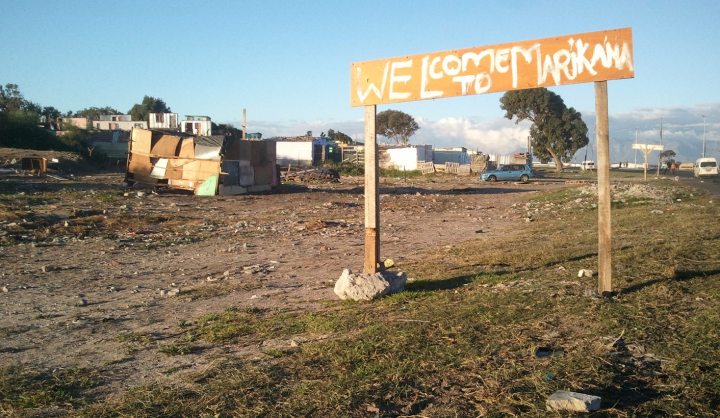South Africa
The other Marikana

About 90 people are still living under a tent almost two months after their shacks were demolished by the City of Cape Town’s Anti-Land Invasion Unit, on Symphony Way in Philippi East. By MARY-ANNE GONTSANA.
Hundreds of Lower Crossroads backyard dwellers started building their shacks in a vacant piece of city-owned land in April. This land and Lower Crossroads were separated by a road, so residents could clearly see that it was vacant.
It started with a small group of people going to erect their shacks on the land, without the knowledge that it was city-owned. They started building for different reasons such as not being able to afford rent and having problems with the landlord of the place they were staying in.
“More and more people then followed until Symphony Way was filled with people’s shacks,” said interim chairperson of Abahlali baseMjondolo in the Western Cape, Siyamboleka James.
It was only after four days that this small community had developed, that the Anti-Land Invasion Unit came in and started demolishing the “illegal structures”. That they did so without a court order has caused controversy.
Claiming that they were just sprung upon by law enforcement and forced to vacate their homes while they were being demolished, this is when they dubbed the informal settlement Marikana. They took the name from the August 2012 massacre in Marikana on the platinum mines.
According to James, each time the city demolished the shacks, residents would soon after start rebuilding. This happened a number of times.
Mayoral committee member for human settlements, Tandeka Gqada, said that in keeping with their mandate the City would do what it could to assist, within the limits of the law. “The City will continue to monitor the situation and act within the law if any attempts are made to illegally occupy the land. However, the City of Cape Town is not obliged to find alternative accommodation for illegal land invaders.”
Gqada’s executive support officer, Patrick Silo, confirmed that there was no court order during the demolishing. “Yes, that’s true; the City did not need to have a legal eviction order as they used the Prevention of Illegal Eviction from and Unlawful Occupation of Land Act to evict, which clearly stipulates that the City does not need an eviction order if the occupants of the land have not yet settled in the houses, which was the case here.”
Constitutional law expert Pierre De Vos disagrees with the City’s interpretation and writes, “[N]o matter how the City tries to justify its actions, these evictions (conducted without first obtaining a court order) remain unlawful.” He explains:
[S]ection 26(3) of the Constitution limits property rights by prohibiting anyone – including a municipality – from evicting someone from their home, or having their home demolished, without an order of court made after considering all the relevant circumstances. The Prevention of Illegal Eviction from and Unlawful Occupation of Land Act (PIE) gives effect to this right, but extends the right to protect all those who unlawfully occupy not only homes but also land. An unlawful occupier protected by PIE (and who can therefore not be evicted from either land or home without a court order) is defined as “a person who occupies land without the express or tacit consent of the owner or person in charge, or without any other right in law to occupy such land.” In South Africa, only a court can order the eviction of any human being from either land or from a home.
Abahlali is a movement of shack dwellers and has been campaigning against the City demolishing these structures. The organisation published a timeline of events as they started happening in Philippi on 29 April (edited by GroundUp):
- 10:04am. Law enforcement has arrived at the occupation and is marking out shacks for illegal demolition.
- 2:51pm. There have been demolitions, threats, beatings, assaults, people shot with rubber bullets, the confiscation of the phone of a spokesperson and two arrests. People marched to the police station to demand the release of the two arrested.
- 4:18pm. Two hundred people barricaded the police station. The Police Commissioner has said that they are being used by the third force.
- 10:18pm. The police agreed to release the two arrested people at about 9pm. At the same time shacks were rebuilt on the newly occupied land.
Sandile Ngoxolo, chairperson of the Marikana Land Occupation and member of Abahlali, said the situation had not changed and residents would stay in Marikana until a plan was made outlining where they could move to. “This land has long been a hotspot for crime, people have been raped and robbed here, we wanted to use it for living but it seems like the City does not want that to happen.” DM

















 Become an Insider
Become an Insider